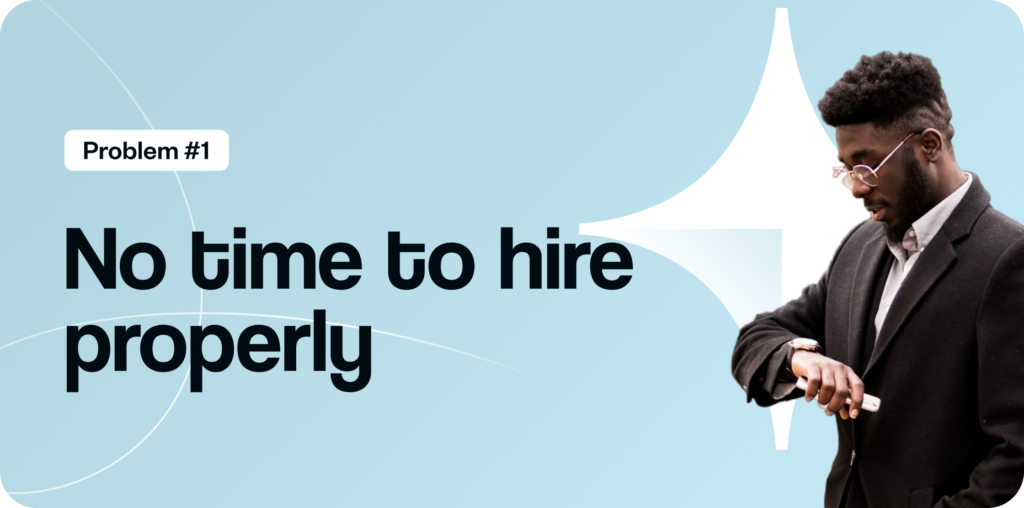05. Article Jason – The 4 Pillars of CSM Hiring
Customer Success is all the rage in 2024. Technological breakthroughs and the rise of the subscription economy have made customer retention more important than ever before.
In fact, Forrester reports that a 5% increase in retention rates yields a ~25% increase in profitability. And acquiring a new customer is roughly 5 times more expensive than retaining an existing one.
As a result, there’s been a global shift in how we approach customer success management. In another Forrester report, the market research firm revealed that a well-designed Customer Success program can potentially net you a 91% ROI over just three years.
The message is clear: Help your customers succeed with your product, and you’ll succeed as a company.
It’s the people who make Customer Success happen, though. So, to get that type of ROI from your program, you need the right people on your Customer Success team. And there’s no room for half-measures.
Hiring top-notch CS Managers requires you to focus on four pillars: Experience, Archetype, Passion, and Culture. We’ve invited our fellow Customer Success leader, Jason Noble of Vinli Inc, to share his insights on how these four defining traits come together.
- Problem #1: No time to hire properly.
- Problem #2: No tools to screen candidates.
- Can AI fix the noise in hiring?
- 📚 Pillar #1: The Right CSM Skills
- 🧬 Pillar #2: The Right CSM Archetype
- 🤝 Pillar #3: The Right CSM Culture
- 🔥 Pillar #4: The Right CSM Passion
Problem #1: No time to hire properly.

Before we dive into the four pillars, let’s call out the massive elephant in the room: the relentless time crunch.
Every CS leader is currently wrestling with an ever-increasing workload. With the rise of subscription-based business models, the demands on CS teams are only going to increase.
Finding that sweet spot between (a) the time required to source the perfect candidate and (b) the limited hours a hiring manager can realistically devote to the search is a tough needle to thread. On one hand, you (obviously) need to fill the role. On the other, urgent, hair-on-fire tasks are staring you right in the face.
According to Noble, a huge problem is the lack of forethought when it comes to hiring.
“You quite often need to hire yesterday. So it can be a rushed process. And when you’ve got lots of CVs to look at, and you’re spending even less time on it, you’re not doing it at the level of quality you need to be. So what I should be doing is spending the right amount of time looking at the CVs properly, doing a proper analysis on them. And I don’t think we have time to do that.”
People tend to wait until the last minute, realizing they need someone when it’s already too late. This leads to a rushed hiring process and potentially bringing on a team member who isn’t the right fit.
Problem #2. No tools to screen candidates.
 Even in a pie-in-the-sky scenario where your hiring manager miraculously finds enough bandwidth to embark on a thoughtful, in-depth search for a CSM, one massive roadblock remains: Do they have the right tools to properly vet each candidate?
Even in a pie-in-the-sky scenario where your hiring manager miraculously finds enough bandwidth to embark on a thoughtful, in-depth search for a CSM, one massive roadblock remains: Do they have the right tools to properly vet each candidate?
Thanks to the internet, the average job listing receives 250+ candidates. Yet, ~4-6 of them will get a call for an interview.
There are two possibilities here:
- The company have the bandwidth to sift through the whole applicant pool, so they tool the first handful of candidates that looked like a good fit.
- They offloaded the vetting process to an ATS, which eliminated the other 245+ jobseekers in seconds.
Either way, you’re left to wonder: Did we REALLY find the best candidates? Or did we miss a few people?
The answer, more often than not, is the latter.
The problem with ATS is they automatically weed out “bad fits” is that, despite not being able to assess the Four Pillars, they are highly susceptible to bias — rigid filtering algorithms screen out qualified candidates whose profiles aren’t retrofitted with the right keywords.
There are two possibilities here:
- The company have the bandwidth to sift through the whole applicant pool, so they tool the first handful of candidates that looked like a good fit.
- They offloaded the vetting process to an AI-powered ATS, which eliminated the other 245+ jobseekers in seconds.
Either way, you’re left to wonder: Did we REALLY
Noble echoes this sentiment. In his experience, this problem only gets worse as you up the volume of applicants.
“You get so many CVs that if you go through a manual process looking at the CVs, you’re either using application tracking systems that are old, they don’t work properly, they don’t use AI yet, or you’re manually going through CVs. So I don’t think we have the tools at all.”
Maybe you’ve conquered the time crunch. But you’re still stuck with a towering stack of resumes and a calendar full of interviews that tell you next to nothing about a person’s true skills.
Can AI fix the noise in hiring?
“Just use AI.” That’s what seems to be the go-to solution to everything, these days.
But AI is nothing more than smarter, faster computer software. We can’t just shoehorn it into an outdated, resume-driven application process.
Doing this is putting a Baind-Aid on a gaping wound. Sure, using AI to automate candidate outreach and rank resumes based on keywords won’t solve the root problem. And the quality of this ranking will be…questionable.
Candidates aren’t keywords. They’re people. All you’re doing is automating an already profoundly broken system focused on the wrong signals. To create a hiring system with AI as the core driver, we have to redesign the entire experience from the ground up.
You need something that accounts for candidates’ diversity of backgrounds and professional experience. Something that goes beyond hard skills on the resume and takes into account soft skills, work style preferences, and a whole slew of other factors.
That’s exactly what we’re doing at Talentway — role-specific AI can help thousands of job seekers create their unique CSM profiles and then assist hiring managers in:
- Structuring their job needs
- Understanding the unique strengths of each candidate without bias
- Running world-class assessment and interview processes
📚 Pillar #1. The Right CSM Skills
With or without AI, resumes tend to be the beginning and end of most skills evaluations. You know, those masterfully crafted works of fiction where some candidates can literally write whatever they want about their backgrounds?
No wonder hiring managers get blindsided by underqualified hires who “look great on paper”! Only with multiple data points that directly mirror the work can you reliably surface who has the right competencies to excel.
When Noble hires CSMs at Vinli, he believes everything on a CV, but he takes it with a grain of salt.
“If someone says they have such a skill on a CV, I will believe it. All you can assess is how well that person writes. What I want to know is, ‘How well can we work with them.'”
Years of CSM Experience is our first matching parameter. Obvious yet critical.
How long have they been in the customer success trenches? Can we take a risk by hiring a person without the same experience?
Noble thinks some of the best CMS hires come from outside the Customer Success profession.
“Some of the best CSMs I’ve hired are people that have come perhaps not from a CSM role, but they’ve been in other customer-facing roles. So your ideal Customer Success team includes people that have come from a sales background, support, project management, includes someone on the technical side. It’s having a real mix.”
Truly evaluating skills and experience for a customer success role requires going way deeper into their CSM experience. At Talentway, we define a few critical dimensions that need scrutinizing, including:
- Number of accounts managed — Nurturing high-touch relationships with 10 Customers differs greatly from communicating with 100 Customers at scale.
- ARR per account — Managing high-revenue accounts is a different beast with intense expectations.
- Client size — There’s a massive learning curve when supporting enterprise clients compared to small businesses. Size absolutely matters.
- Level and types of stakeholders — Dealing with the C-suite is a world apart from end-users (and many CSMs will have to deal with both). Your CSM needs fine-tuned skills for the specific types of people they’re going to deal with in their role.
- Performance Outcomes — Do they have a proven track record of driving renewals, product adoption, upsells, and cross-sells for their previous companies?
- Industry/domain expertise — It could take years for a CSM to speak the same language as customers. Or, they could hit the ground running.
🧬 Pillar #2. The Right CSM Archetype
When it comes to defining the ideal Customer Success Manager for your team, it all starts with spelling out the key responsibilities that map to the right natural talents.
According to Noble, much of the role-based hard skills are teachable. Coachability and collaborative intelligence are the must-haves.
“I can teach technical, industry, negotiation, and commercial skills. What you can’t teach is aptitude and attitude. So I need this person to come in. They have to have big conversations. An industry – I’m not worried about that. That I can help with. But I need someone who can fundamentally collaborate and work with other people.”
This hiring pillar is all about attracting professionals who’ll be highly productive from day one with an elevated ceiling for rapid growth. That’s why at Talentway, we take an expansive view of the unique combination of each person’s strengths in the CSM career.
We call it the CSM Archetype, a sweet spot of qualities and values that sets each CSM up for the highest levels of growth and success.
We discovered 10 most typical CSM Archetypes with different superpowers:
- Onboarding & Learning Facilitator
Guides customer onboarding and learning. - Value Demonstration Expert
Effectively communicates product benefits. - Metric Storytelling Master
Crafts compelling stories with metrics. - Stakeholder Relationship Builder
Fosters strong stakeholder ties. - Strategic Advisor & Consultant
Offers strategic guidance. - Client Voice Ambassador
Represents the voice of the client within the team. - CS Process Improver
Enhances customer success processes. - Project Management Lead
Leads project coordination. - Success Story Manager
Manages and promotes success stories. - Data Analytics Guru
Expert in data analysis.
🤝 Pillar #3. The Right CSM Culture
There is no “right” or “wrong” culture. But cultural fit defines whether a CSM will stay on your team for a long period of time. According to Noble, the right cultural alignment at all levels — from organizational maturity to mindfulness and emotional intelligence — is what creates elite CS teams.
“Ultimately, culture to me means: ‘Can this person work with my team and me? Will they be able to collaborate and work with me?’ It’s a group of people working together with similar mindsets and approaches.”
Talentway looks across the combination of multiple cultural profiles that each team and each candidate could map to:
- Competitive/Winner Culture
- Role/Guidelines Culture
- Achievement/Excellence/High-Performance Culture
- Consensus-Driven/Inclusion Culture
- Fluid/Autonomy/Conscious Culture
The truly exceptional CSM won’t just see the world through one lens. They’ll have an integral blend of the five cultural profiles above. It’s this multicultural versatility that allows them to deftly navigate intricate customer relationships.
Having the same core values and work ethics creates magic between all team members. So, when hiring, it’s important that CS leaders foster a culture of diversity, respect, and transparency where everyone can thrive. Each individual brings something unique to the table, and it’s this diversity that enables teams to excel in their roles.
🔥 Pillar #4. The Right CSM Passion
Passion is the make-or-break factor. Skills and abilities only predict a hire’s potential performance. It’s the energy and enthusiasm they bring to the work that truly unlocks the superhero within. Real passion is what allows exceptional CSMs to outperform peers with similar technical competencies.
It’s possible to identify candidates who radiate passion across three dimensions:
- Passion for the domain/product. You want insatiable learners who devour knowledge and engage clients with world-class industry expertise.
- Passion for the company’s purpose. Missionaries and ambassadors who bleed your company values are the ones who’ll build your company with you. They walk the talk, authentically evangelizing your mission while inspiring customers with zeal.
- Passion for the Customer Success craft. A pure love for the CS profession itself that transcends any specific company or industry. A reverence for delivering stellar customer experiences.
Passion is often binary — a candidate either has it or doesn’t. There’s no faking the chip on their shoulder and fire in their eyes to be the absolute best. Jason shares an actionable insight regarding our Passion pillar:
“What do I ask when I interview? One of the big questions I ask is, “What does Customer Success mean to you?” And I’m not asking them what a CSM is. I’m asking them what Customer Success is. It might seem philosophical, but it brings out critical information about the person. Can I have a real meaningful conversation with them? Do they understand my customers’ challenges? Do they see the problems we need to solve? Do they understand what value really is?”


